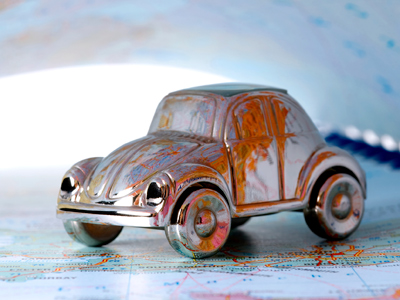
Ask the AI Tutor
Need help with Germany: 1933-1945 - Life In Nazi Germany, 1933-1939? Ask our AI Tutor!
AI Tutor - Lucy
Connecting with Tutor...
Please wait while we establish connection

The Volkswagen Beetle was developed on the orders of Adolf Hitler.
Germany: 1933-1945 - Life In Nazi Germany, 1933-1939
Life in Nazi Germany changed politics, work, education, and leisure. This quiz tests how the dictatorship affected ordinary people between 1933 and 1939.
1 .
Which organisation was at first restricted to 100,000 men, but soon numbered 750,000 with 1,000,000 reservists?
The German Navy
The German Air Force
The German Army
The SS
At repeated rallies Hitler announced German re-armament
2 .
Nazi ideology assumed German advance eastwards to rule over much of Eastern Europe, including Poland, the USSR, the Baltic States and Romania. Which German term means such expansion for the German race, which was said to be too confined within existing borders?
Herrenvolkseinsiedlung
Lebensraum
Rassenangriff
Drang nach Osten
Hitler always envisaged expansion to the East, where he regarded the existing occupiers as totally inferior to the "Master Race"
3 .
Goebbels hosted an exhibition in 1937 where he showcased so-called "degenerate art", and even invited Hitler himself to a viewing. What term was used in German to describe such "inferior" art?
Undeutsche Kunst
Untermenschliche Kunst
Entartete Kunst
Auslandische Kunst
Goebbels argued that his exhibition contained art works that were unworthy to represent the German people
4 .
The secret police played a key role in Hitler's Germany. What was their name?
Geheime Staatspolizei
Sicherheitsdienst
Oberkommando Wehrmacht
Volkspolizisten
Germans were taught that there was a higher loyalty than allegiance to their immediate family. The secret police expected to be informed of any suspicious behaviour - even by children accusing their own parents
5 .
At the Berlin Motor Show in February 1939, Porsche showed Hitler the prototype of a mass production saloon car for the German people. By what name was this car eventually known?
Volkswagen
BMW
Mercedes
Porsche
Hitler was keen to encourage a popular car, that most Germans could afford, and that would grace his new motorway network
6 .
In November 1938 Goebbels encouraged a series of anti-Jewish incidents, involving attacks on Jewish-owned properties. What name was given to these outrages?
Pogroms
Kristallnacht
Moving Towards the Fuhrer
Racial Measures
Hitler's lieutenants were keen to show their zeal for Nazi ideology by carrying out from time to time outrages, that would win his approval
7 .
Hitler liked to style himself as "Fuhrer", and to wear Nazi Party or military uniform rather than formal civilian dress after 1934. What does the word "Fuhrer" mean?
Leader
Dictator
Chief Military commander
Chief Minister
The Nazis made much of what they called "Fuhrerprinzip", by which they meant a hierarchical mode of government based on loyalty and obedience to one man
8 .
At the 1936 Olympic Games, held in Berlin, Hitler was dismayed by the extraordinary success of a black American athlete, who won no less than 4 gold medals. Who was this?
John Lauterpacht
Jesse Owens
Martin Dude
Frederick Loom
The 1936 Olympics was an opportunity to showcase Nazi racial theories and the superiority of the Aryan race. Victories by black American athletes, however, showed the absurdity of such ideas
9 .
The German Labour Front was set up to direct workers into projects where they were needed - especially rearmament schemes. Who was the leader of this organisation?
Ernst Kaltenbrunner
Alfred Rosenberg
Robert Ley
Albert Speer
The Nazis were determined to mobilise German labour, supported by foreign recruits, to back up their increased armed forces towards eventual war
10 .
Which of the following minority groups within Hitler's "Third Reich" was not targeted for extermination on the grounds of racial inferiority?
Danes
Gypsies
Jews
Poles
The Nazis were clear that certain minorities within Germany (either ethnic or religious) were inferior according to Nazi racial theory
**Unlimited Quizzes Await You! 🚀**
Hey there, quiz champ! 🌟 You've already tackled today's free questions.
Ready for more?
Ready for more?
🔓 Unlock UNLIMITED Quizzes and challenge yourself every day. But that's
not all...
not all...
🔥 As a Subscriber you can join our thrilling "Daily Streak" against other
quizzers. Try to win a coveted spot on our Hall of Fame Page.
quizzers. Try to win a coveted spot on our Hall of Fame Page.
Don't miss out! Join us now and keep the fun rolling. 🎉
**Unlimited Quizzes Await You! 🚀**
Hey there, quiz champ! 🌟 You've already tackled today's free questions. Ready for more?
🔓 Unlock UNLIMITED Quizzes and challenge yourself every day. But that's not all...
🔥 As a Subscriber you can join our thrilling "Daily Streak" against other quizzers. Try to win a coveted spot on our Hall of Fame Page.
Don't miss out! Join us now and keep the fun rolling. 🎉






